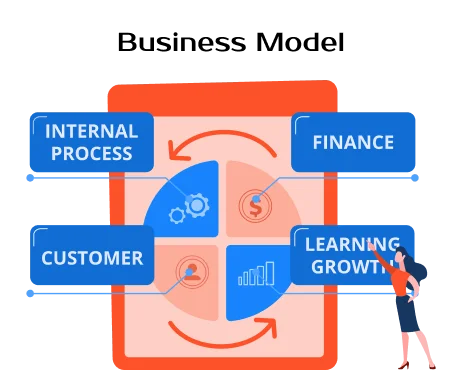Artificial Intelligence in Finance
Published:
June 22, 2025

Artificial Intelligence (AI) has become a transformative force within the financial sector, driving innovation and reshaping traditional methods of operation. Rapid advancements in machine intelligence, cognitive computing, and automated systems have enabled financial institutions to enhance services, increase security, and manage risks more effectively. Organizations, from banks to insurance providers, are constantly seeking strategic ways to leverage AI solutions for tasks ranging from personalized customer engagement to large-scale market analysis.
Integrating modern algorithms and learning models into monetary processes has spurred an entirely new era of efficiency and precision. This shift offers remarkable potential for expansion and prompts financial institutions to navigate complex challenges involving data privacy, regulatory compliance, and talent management. Ultimately, a robust AI-driven approach equips businesses with deeper insights, fosters innovative product development, and helps them remain competitive in a swiftly evolving digital ecosystem.
Applications of AI in Finance
Within the broad realm of finance, finance artificial intelligence solutions are being adopted to automate tasks, strengthen detection capabilities, and streamline decision-making. These applications cover every aspect of financial operations, including fraud prevention, risk assessment, algorithmic trading, customer assistance, portfolio administration, and compliance with regulatory frameworks.
Fraud Detection and Prevention
Fraud detection mechanisms in the banking industry often involve analyzing vast amounts of transactional data. Machine learning models and pattern-recognition algorithms help identify unusual activity, such as suspicious money transfers or unauthorized account access. This proactive detection process allows a bank or other financial institution to react swiftly, thereby reducing potential losses and maintaining customer trust. AI-powered systems can continuously refine their models through advanced data processing, learn from each identified threat, and adapt to emerging criminal schemes in real-time. Furthermore, these solutions can automate alerts, enabling security teams to focus on tasks requiring human intuition and oversight.
Credit Risk Assessment
Assessing creditworthiness is crucial in lending operations, insurance underwriting, and other financial products. Traditional evaluation methods relied on limited indicators such as credit score and financial history. AI-based technologies, however, expand the scope by integrating additional factors, including alternative data sources, real-time payment patterns, and broader customer metrics. This holistic approach to credit risk management can enhance accuracy by highlighting crucial yet overlooked variables. Automated credit scoring tools accelerate approval processes, reduce paperwork, and allow financial service providers to make swift lending decisions with more confidence.
Algorithmic Trading
Algorithmic or quantitative trading utilizes sophisticated models to execute trades based on real-time market indicators, historical data, and predictive analytics. By processing vast datasets at lightning speed, AI-driven systems can identify opportunities, place orders, and exit positions more rapidly than any human trader. These automated platforms rely on continuous learning to refine their trading strategies, adapting to shifts in the global market and minimizing exposure to adverse fluctuations. Although algorithmic trading can yield significant returns, it also demands robust oversight to mitigate systemic risks and potential volatility resulting from instantaneous, large-volume trades.
Customer Service
AI chatbots and virtual assistants increasingly power customer service in the financial sector. These systems can handle routine inquiries, direct clients to relevant resources, and offer tailored product recommendations based on user transaction history. As natural language processing (NLP) grows, chatbots become more adept at interpreting nuanced questions and responding human-likely. AI-driven platforms free up service representatives to concentrate on complex or sensitive issues. Furthermore, these virtual agents help institutions manage large volumes of customer interactions, delivering a consistent experience and reducing wait times.
Portfolio Management
AI tools support wealth managers by analyzing multiple factors such as market conditions, client risk profiles, and macroeconomic indicators. Portfolio recommendations can be generated in real time, enabling faster reaction to market volatility or changes in a customer's personal financial situation. By leveraging big data analytics, wealth advisors can identify investment opportunities that align with specific risk tolerances, time horizons, and financial objectives. These intelligent systems can also automate portfolio rebalancing, improve efficiency, and ultimately allow managers to build stronger relationships with their clients through more accurate and personalized insights.
Regulatory Compliance (RegTech)
Regulatory compliance requires scrutiny of evolving rules and guidelines, adding complexity to financial operations. RegTech uses AI to automate compliance processes, analyze regulatory updates, and generate alerts for potential violations. By integrating AI into compliance systems, banks, insurance companies, and other institutions can reduce the risk of penalties, improve reporting accuracy, and maintain transparent relationships with governing bodies. This bolsters organizational security and provides a structured framework for meeting global standards, demonstrating a commitment to ethical and lawful operation.
Need help improving your business? Let’s talk
Benefits of AI Integration in Finance
The adoption of finance and AI leads to multiple advantages:
- Increased Efficiency
- Enhanced Accuracy
- Improved Decision-Making
- Cost Reduction
- Personalized Services
By focusing on these areas, organizations can develop a strategic approach that aligns emerging AI capabilities with the broader objective of optimizing operational processes and delivering higher value to stakeholders.
Challenges and Risks
Despite the myriad benefits of intelligent technologies, the financial domain must contend with certain challenges and risks associated with AI. These concerns involve regulatory complexities, potential algorithm biases, and data security questions. Addressing these issues requires a balanced approach, carefully weighing efficiency gains against ethical and operational considerations.
Data Privacy Concerns
Financial data is inherently sensitive. Any breach can lead to immense reputational damage, legal consequences, and loss of client confidence. AI systems often rely on expansive datasets to train models effectively, but using personal or transaction-based information raises privacy questions. Instituting strict data governance policies, robust encryption, and secure storage solutions is crucial to protect sensitive records. Additionally, compliance frameworks must remain flexible enough to support emerging AI tools without compromising fundamental security standards.
Algorithmic Bias
Algorithmic bias can occur when the data used to train AI models does not accurately represent the diversity of real-world populations or includes historical prejudices that skew outcomes. In the financial sector, biased models could lead to unfair lending practices or inequitable insurance premiums. Continually monitoring machine learning outputs and transparent auditing processes are paramount for identifying and correcting any skew. Institutions must foster a culture of responsible technology usage to ensure that decision-making systems remain fair and impartial.
Regulatory Uncertainty
Laws and guidelines related to AI are continually evolving. Financial regulators may implement stricter cybersecurity, privacy, or model validation rules. Organizations could be precarious if regulatory bodies demand sudden changes to AI-powered processes. Institutions typically maintain collaborative relationships with governmental agencies to mitigate this risk and closely monitor legislative developments. Proactive measures and a willingness to adapt can reduce disruptions while reflecting an ethical innovation approach.
Job Displacement
As AI automates numerous tasks — ranging from data processing to frontline customer support, there is a legitimate concern regarding the displacement of human roles. Employees whose functions become partially or fully automated may face uncertainty, impacting team morale and productivity. While AI can create new avenues for specialized roles in areas like advanced analytics or machine learning oversight, businesses must invest in staff retraining and skill development. Balanced workforce strategies ensure that the implementation of AI drives progress without leaving employees behind.
Future Trends
As technology continues to evolve, the use of AI in finance will broaden in scope and complexity. Future trends point toward deeper integration with other emerging technologies, a stronger focus on transparency, and further advancements in specialized domains like linguistics and blockchain.
Integration with Blockchain
Combining AI with blockchain technology can lead to more secure, transparent, and efficient processes. Blockchain's decentralized nature reduces the need for intermediaries and can offer a permanent, tamper-proof record of transactions. When merged with AI-powered analytics, this structure enables faster identification of anomalies or malicious activity. Smart contracts benefit from real-time data, potentially automating tasks like insurance claims or loan approvals. Ultimately, the synergy between blockchain and machine intelligence may drive new financial products and platforms tailored to evolving market needs.
Advancements in Natural Language Processing (NLP)
NLP is instrumental in improving financial institutions' interaction with customers, regulators, and internal stakeholders. Enhanced language models can sort through volumes of text-based documents, extracting insights and trends more effectively. As NLP technology progresses, AI-powered systems will better interpret subtle language cues, including legal and compliance-related texts. This capability can streamline due diligence processes, accelerate underwriting, and free teams from labor-intensive manual reviews.
Development of Explainable AI (XAI)
Explainable AI places emphasis on enhancing the interpretability of machine-generated decisions. This trend is especially vital in finance, where regulatory bodies often require transparent explanations for significant determinations, such as credit denials or trading moves. XAI frameworks aim to illuminate the rationale behind an algorithm's output, helping stakeholders identify hidden biases or errors. By promoting clarity and traceability, explainable AI will likely boost confidence in autonomous decision-making systems and support a more ethical, well-governed approach to technology adoption.
Conclusion
Artificial Intelligence has emerged as a powerful driver of change in the finance sector, empowering institutions to identify patterns, automate processes, reduce errors, and deliver more personalized services. Its influence spans every aspect of the financial world, from fraud detection to robo-advising and from risk assessment to regulatory compliance.





